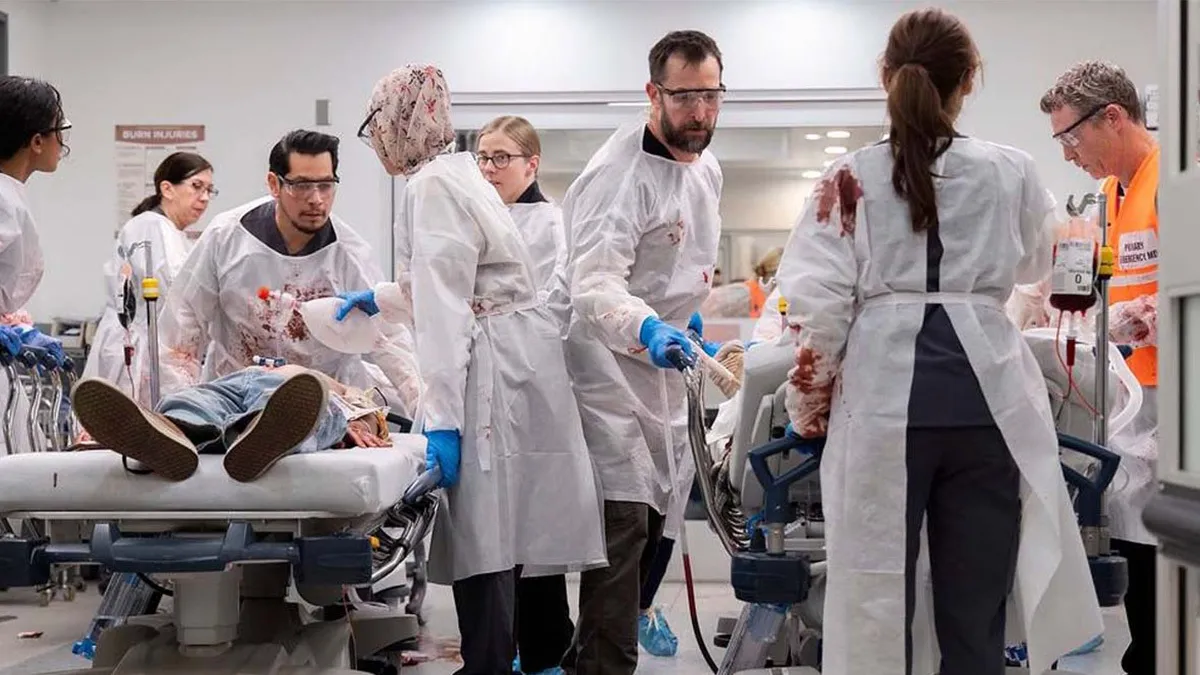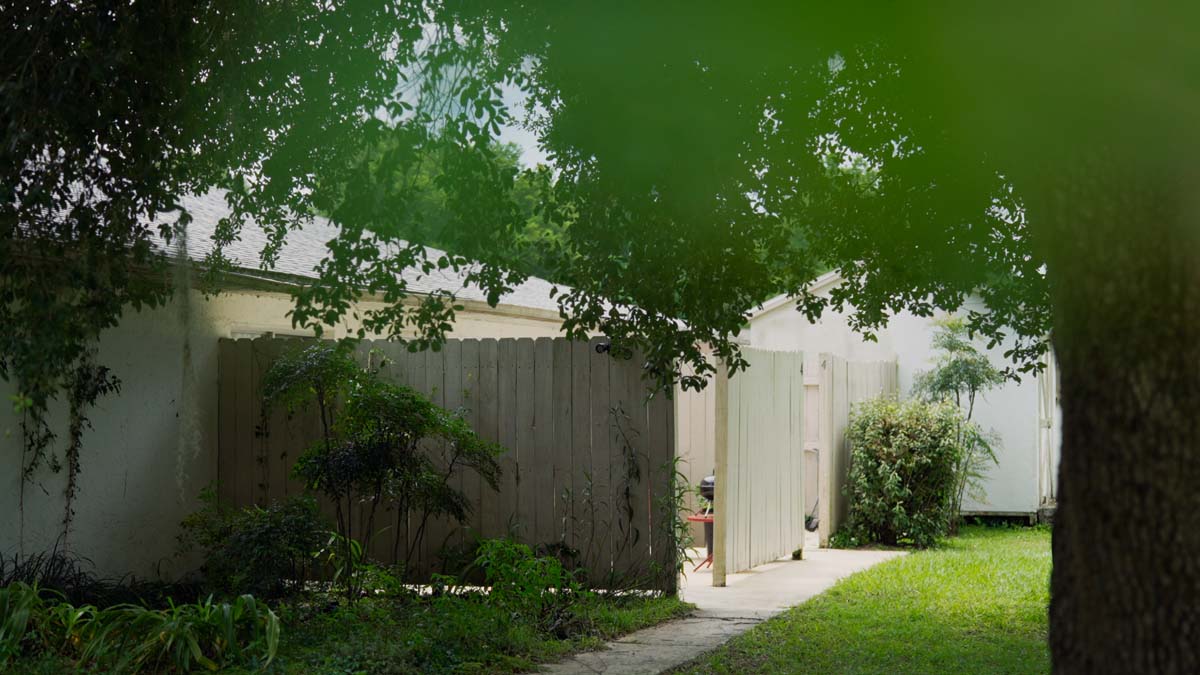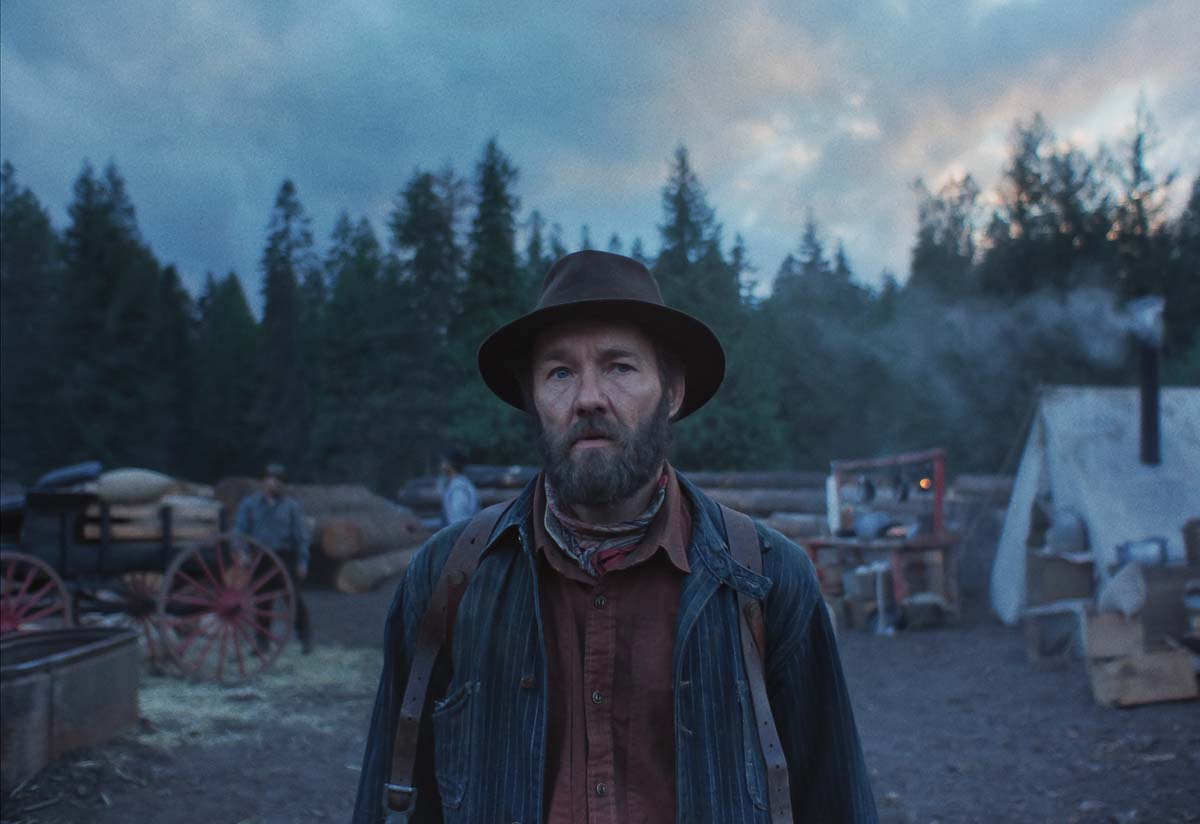Beckham
Emmy, ACE, and BAFTA-winning editor, Michael Harte, ACE, discusses his Emmy-nominated documentary series “Beckham,” including discussions of the need to know where you are starting, the importance of archival that speaks in conversation with the interviews, and the all-important power of the truth.
Today on Art of the cut, we speak with Emmy-nominated editor Michael Harte, ACE, about editing the docu-series, “Beckham.” He was also nominated for an ACE Eddie and a BAFTA for the series.
Harte won an Emmy, an ACE Eddie a BAFTA for his editing of the documentary “Still: A Michael J. Fox Movie.” He was also nominated for an Emmy and an ACE Eddie for his editing of the documentary “Three Identical Strangers.”
Almost always when I interview editors who’ve been nominated for TV series, the episode chosen is either the first or the last. Why did you choose this episode - number 3?
My producer, John Battsek - who’s really one of the best around - adores the episode. He said to me, “You need to put in episode three.” I think the scene that he loves more than anything is the moment where Ferguson and David can break up - “the breakup scene.” We cut back and forth between them. He really loved the editing. It’s nice when people appreciate editing that is subtle, but that said, there’s a lot of unsubtle editing in this episode as well.
I love the great setup of the story about competitiveness, and it’s backed up with a wicked punchline from Figo at the beginning. Can you talk about deciding that that’s where this episode would start and building that?
I think each episode has a little moment with David beforehand to set up the episode. It’s really nice to hang out with David Beckham. That’s the real reason we put it in there: because here’s somewhere nobody’s ever been before, which is in his house or in his life. He’s been guarded up to this point. So we felt like let’s meet him today first before we dive into the episode.
Each episode has its own theme, and it felt like there was a theme about relentlessness and competition and finding your place. It almost felt like finding your place and leaving the confines of your safe place, which what Manchester United was for him.
It also nicely sets up the rivalry, plus you think playing for Manchester United would be the biggest thing in somebody’s career. But what happened by the end of episode two is he’s almost completed that journey when he wins the Champions League in 1989, and how do you go up a notch? Real Madrid is what that is. It was important for us to suggest to the audience: he’s going somewhere he’s never been before. He’s about to go somewhere much more comfortable, which is the world of Figo, Roberto Carlos, some of the greatest footballers of all times. So we had to nod to that because it takes a while until you get to Real Madrid. We needed to say, “This is where we’re going.” So there was thematic reasons and, and logistical reasons.
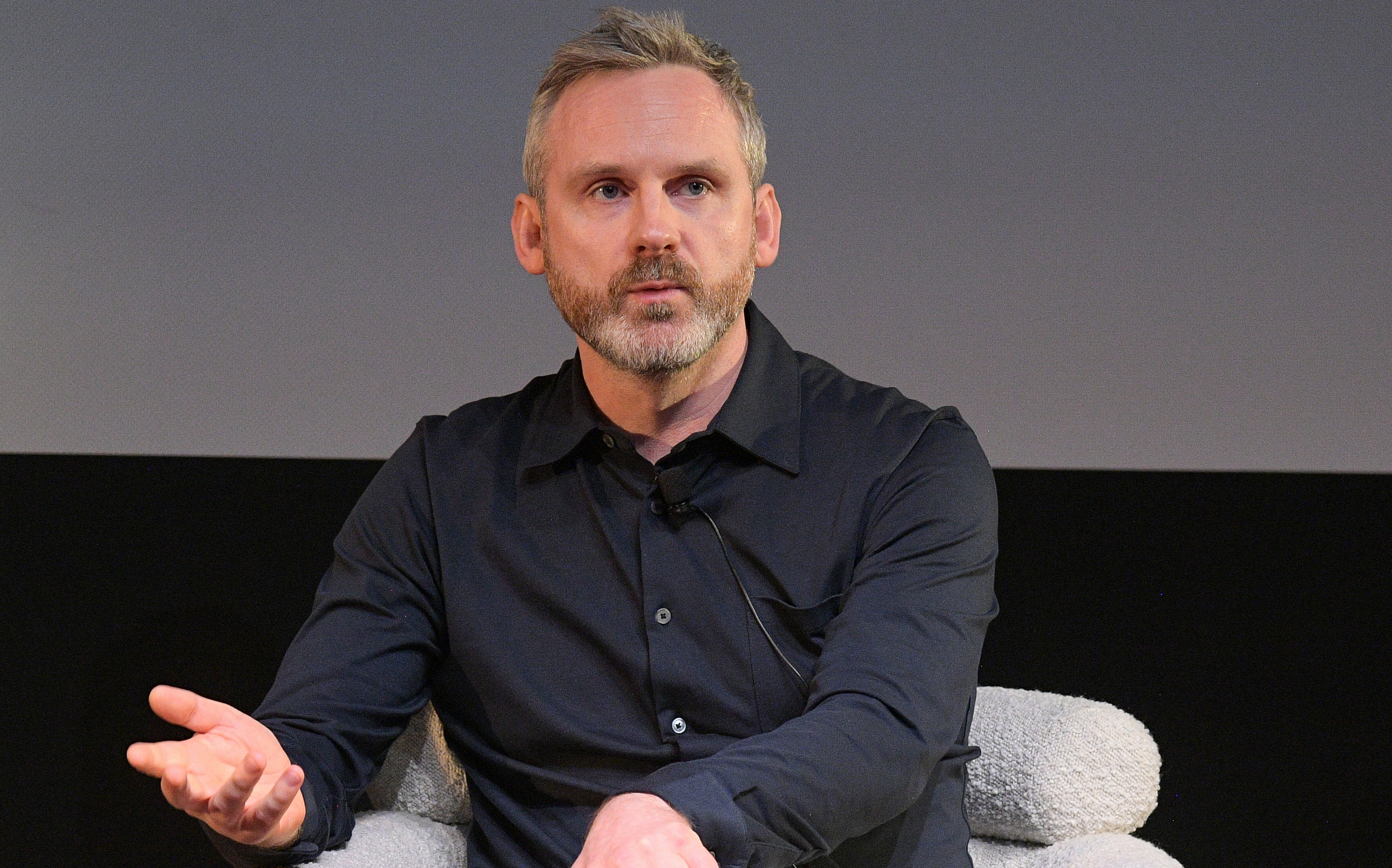
Editor Michael Harte, ACE
I love the idea that there’s this story of his stubbornness at the beginning, illustrated by the shaving of his head. Talk about how that was illustrated and finding that material that shows his stubbornness.
When he joins Manchester United, and he’s with Alex Ferguson. Alex Ferguson’s mantra - a very successful one - is that there’s no I in team. We all work together as a team. Everybody wears the same colored boots. We all wear the Man United jersey and the crest. And he was hugely successful because of it, and David was part of that. He meets Victoria and the Spice Girls and he then steps one of his feet into that world. And THEIR philosophy is: be an individual. Be yourself. Express yourself any way you want. They all wear different clothes. You’ve got Sporty, you got Scary and Ginger and Posh and they don’t wear uniforms. It’s the complete opposite. David’s in the middle of that. He’s right between. He falls in love with both ideologies. It’s Ferguson and Victoria and he’s torn between those two. That sets up a lot of his character in the first two episodes when the cracks in episode three start to show between him and Alex Ferguson - SIR Alex Ferguson! Sorry! Maybe you can actually add in Sir Alex to the top of each of those! That will help me!
That’s the moment where he moves further towards individualism and “I’m going to be who I am now.” He had massive success with Ferguson at that point. It felt like he was moving in a direction that was less about: “There’s no I in team” and moving towards being an individual.
There was so much archive. David’s the most photographed person in the world. And Victoria - when he meets her - she’s one of the most photographed people in the world also. So we had endless archive to play with. The great thing about this documentary is that anything that happened in his life, we had material to play with. I think there’s one shot in the whole series that isn’t from cameras that were really there at the time. I think it’s the aerial shot of Madrid when he goes there. It’s a wide shot of Madrid and I remember thinking, “Let’s get rid of it” because I love this idea that everything that we used was real. It was authentic. When they’re talking about something, we had the material to back it up. So when we got to the stage in his life where he’s starting to shave his head and do his own thing, the material’s just there. So what was great is that we were never limited in the edit to the material that we had because we had everything. It was basically like making a movie. If you needed the rushes, they were available. We always had the pictures to tell any story we wanted, which was so refreshing for a documentary.

Refreshing but also impossible because you have years and years of material.
Yeah. And the worst part of that is that I’m a little like David. I like things being organized, I like things being slightly perfect. I get obsessive about organizing the material and that sounds so boring. It’s the most important thing. I love to watch everything. I like to know where everything is. I like to have everything chronologically categorized. I like to know where everything every character’s ever said - both in archive and interview today, any retrospective interviews. I have to see everything. I cannot settle. I couldn’t edit until I had seen everything that was relative to episode one. I then was comfortable cutting episode one. The problem is that it scares the crap out of directors because I spent a long time in the edit just moving material around and marking stuff up.
And I say to them, every time, “I promise you, if you let me do this, it’ll get fast down the line when the shit hits the fan, I’ll know where everything is.” On this project, more than ever, I realized it that if you’re really organized with everything, when you have a good idea, you can execute it in minutes - maybe a couple hours. But if you’re not organized, and that magic idea comes to you, I guarantee that six out of ten times, that idea will vanish because you’re hunting around or subconsciously you don’t wanna do the idea because it takes too much work looking for the stuff. On Beckham there was a lot of pressure to get the film made. I had to cut four episodes in a year, maybe less. I told everyone, “Just gimme time to get organized and get the material.” The key to making a good movie is to be very boring as an editor and get organized and the creative stuff will flow. It’ll just flow after that.
You must have loved the scene in episode four of Beckham’s organized closet.
I fantasize about having a closet like that. I just don’t have the money for it, but maybe if I win an Emmy he’ll give me that wardrobe! I wasn’t like this when I was a kid. I was messy! I don’t know what happened.
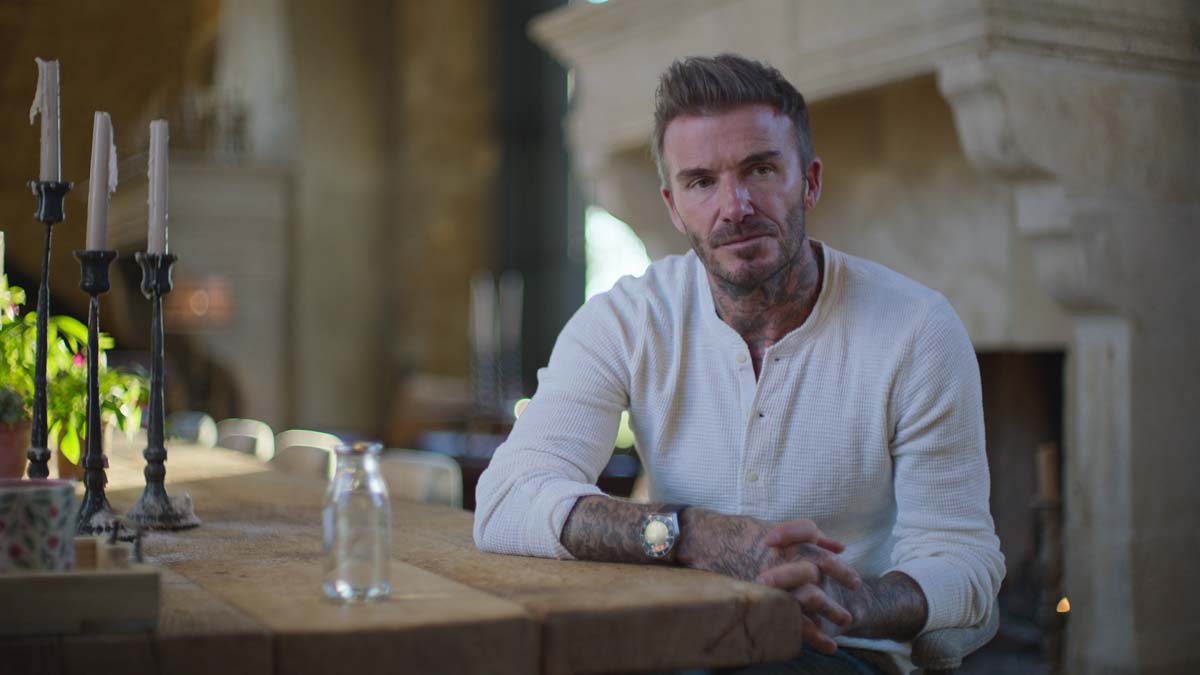
It’s almost like a nature documentary: the construction of the contention between Beckham and Sir Alex Ferguson. As the interview is telling the story, you’re making certain footage look as if it illustrates their relationship: like Beckham backing up his haircut with goals and his coach looking like he’s kind of mad or frustrated.
I had to go through all the games. I had assistants that helped me do that, but what they would do is: they would mark things. Anytime David would touch the ball, I’d just mark it through his whole career! I realized when his interview started coming in, I thought, “Okay, here are the key characters. Gary Neville, Roy Keane, Ole Gunnar Solskjær, Victoria sometimes is in the crowd, but definitely number one was Ferguson. So every time the camera pans to Ferguson, I said, “Make sure we mark that.” There’s just amazing stuff! What we realized is actually that we weren’t looking for goals anymore. Goals are easy to find because you look at the newspaper and it says, “71 minutes he scores that goal.” That was easy. So I could leave that to the assistants to do, but what I was looking for is when he didn’t have the ball and there were those little glances at Ferguson and Ferguson’s glances back at him, but also it was like when Ferguson started eating chewing gum. Anytime he got more and more angry, he would eat more gum. There’s one scene in episode three where he just throws three pieces. He spits and he throws it out. Me, he throws it. This is gold! I remember thinking, “This reminds me of the Karate kid when Daniel LaRusso is in the ring and every time he looks over at Mister Miyage and he looks back at him.”
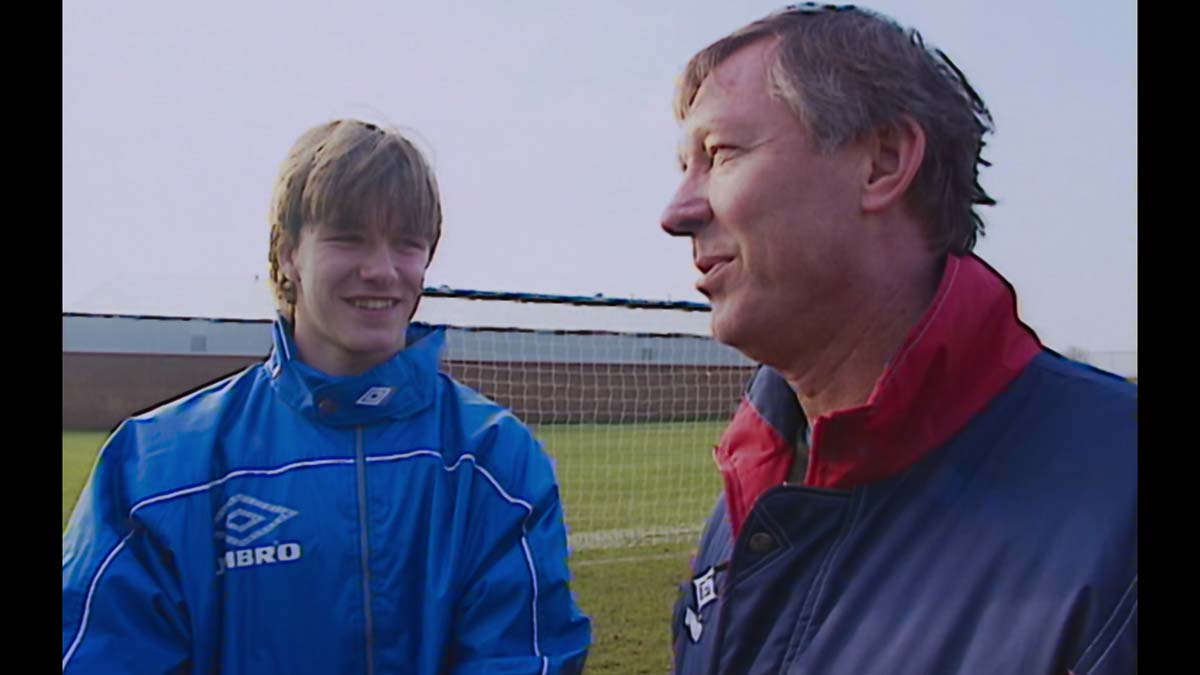
That’s the rhythm of this film. I used to say Beckham is a bit like a sports movie from the eighties and nineties. They had a similar relationship where he was like a father figure to him. So every look was important and I’m obsessive and I wanted, every time I saw Ferguson look at David, it was everything. Especially in episode three, it really came out in this episode. It became really important because there’s a scene I think where he scores the goal against Greece and it’s what should be the biggest moment of his career. A lot of people in England think of that moment as the peak. It got them to the World Cup and it’s so dramatic and for a long time in the edit we thought, “That’s clearly the end of an episode because it’s such a high moment.” This is where the edit can really be fun because you can start to play with structure. I thought actually, “Is it the end of an episode or is it the setup to another one?” Because what’s more interesting is to subvert people’s expectations. The great thing about celebrity documentaries is that a lot of people know the stories in advance, so what you can do is you can subvert that. You can turn it on its head. The secret weapon you have is the audience’s knowledge. And so everyone saw the Greece goal as the greatest moment in his career, but actually what you realize, is that it was almost the beginning of the end between him and Ferguson because he was off to the races in terms of celebrity, and Sir Alex Ferguson didn’t want that. It just became something completely different.
There are shots that we found on the training pitch with Sir Alex looking at David. But what’s great is that he’s not looking at David, he’s looking at his boots and they’re white and it’s no longer black boots anymore and everyone’s wearing black boots, but David’s wearing white boots. If you don’t take your time and look for it, you won’t see it. You won’t find it. God bless us editors! We’re under all sorts of pressure from people, but if you take the time to do it and not worry about people breathing down your neck, that’s the goal that makes the film.
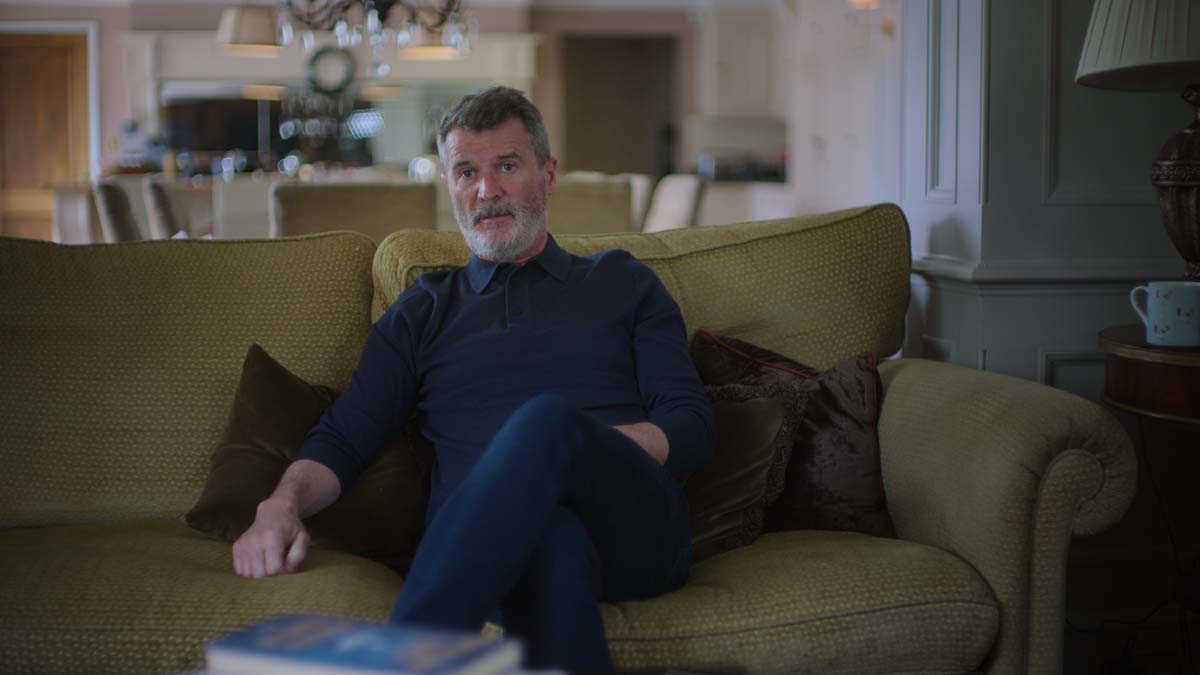
One of the things I noticed was that the interviews are not wall-to-wall. They’re succinct bits. They’re broken up and spread out with music and nat-sound pops. Clearly you had enough interviews that you could have wall-to-wall information, but you didn’t do that.
The only time I wanted to cut interviews back-to-back is when they were contradicting each other. That’s when it’s fun. The biggest sin for me in an edit - when I catch myself doing it - “Let’s go home and take a break” when I’m using archive to wallpaper over an edit. Archive is just as important as interviews and neither should lead. I always think they should be talking to each other. I love archive. The older I get, the more I adore it. I think it’s because maybe it’s nostalgic for me. Also, you can let archive play a little longer. It means there’s less to edit and so there’s less work for me! Maybe that’s why I love it.
I don’t believe that!
You can have so much fun with archive and the worst thing you can do is just have an interview say something, then you see the same thing in archive. You’ve gotta push yourself. I’ve had a lot of really great directors I’ve worked with over the years, like Tim Wardle and Davis Guggenheim and Mark Lewis and, and now Fisher. Those guys really understand what archive is and they’re all really great interviewers, but they understand. I learned from a lot from them how you can use archive in a different way so that it’s not just pictures. Also the audio is really terrible in archive, but if you pay attention, you slow down, you can improve it and listen to the right microphone. There’s always stuff in there.

I wanna give an example of that. I love the edit in the haircut sequence where the music’s pumping and there’s crowd gathered around. He shaved his head and David gets in a car and as he closes the door, the music cuts out as if the music was outside. And then there’s a little pause and he swears as a punchline.
He says, “Jesus Christ!” I love that you love that because little moments like that are things I spend time doing and nobody notices.
I noticed something at least every minute!
I love using music. You’ve got to use music almost like a character, like another character in the movie. We’re pulling out some of the best tracks around. Music can be wall-to-wall as well and I’ve been on edits where I come in and people have just laid out music constantly and it doesn’t do anything. You play it and feels like, “Is somebody next door playing the music? This is not doing anything for me.” I like to use music to tell a story, to give it not just pace but character. In that scene, what’s great about the music is there’s just so much noise in his life. It is coming from every direction and the fans are on another scale. Manchester United are becoming a force, and the music was reflective of that. So when I saw the scene of the door closing, I remember thinking, “Oh, I know what we can do! We can build the scene and work in reverse. Find me a song that is just relentless and loud and noisy so when he closes that door, we’ll make a little point, which is “the only safe place this poor guy’s got is in his car.”
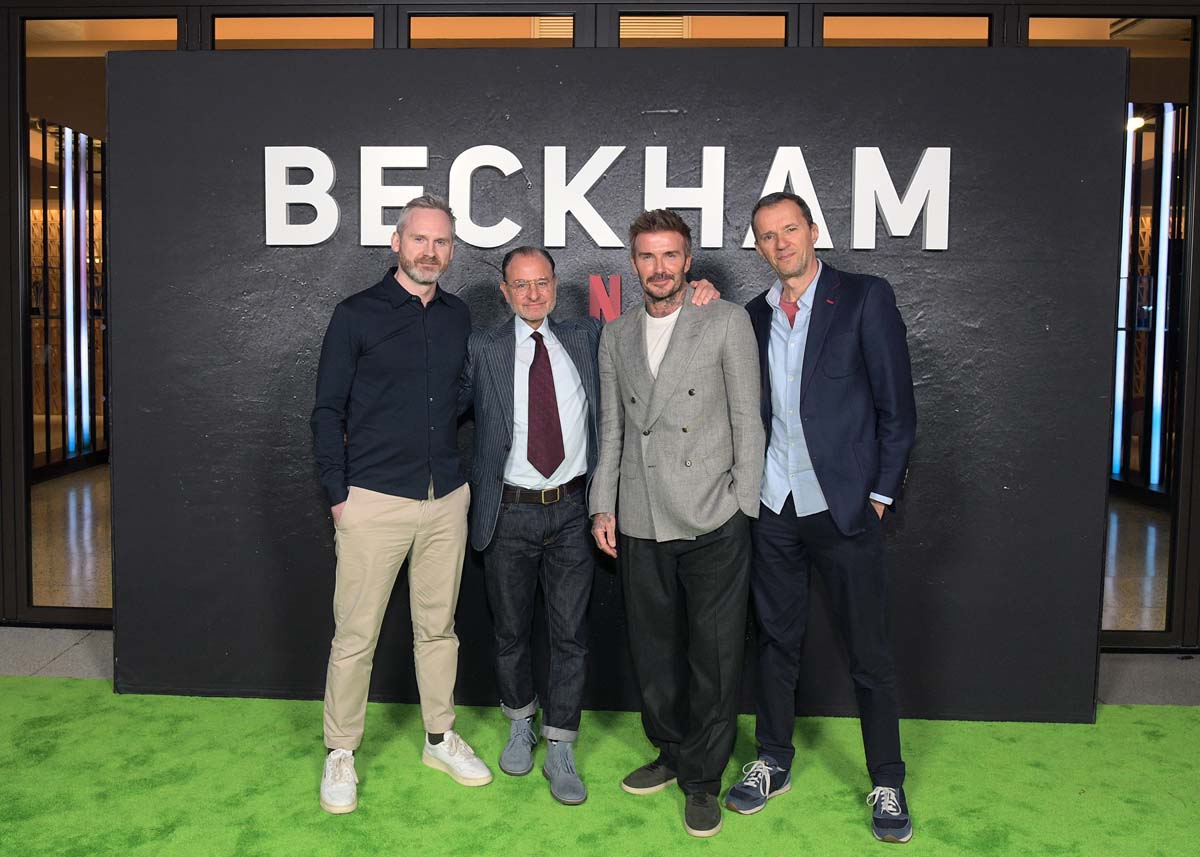
Were you cutting with temp or were you literally saying, “This is the piece of music I’m using and somebody’s WILL license it for me”?
I’m terrible because I just use whatever I want. I love using temp. I struggle to cut without it.
For the score stuff…?
It’s temp for the score. I’ll use a lot of instrumental stuff. I cycle to work. I shouldn’t do it, but I listen to music on the way to work - commercial music - and I let Spotify just do its own thing. I don’t get time. You don’t get time in the edit to sit around. If you’re sitting around and listening to music in the edit, you get fired. And I can’t do it at home ‘cause I’ve got two kids under three, so the only time I get to listen is on the bike. I like to use big tracks. I think it’s fun and it causes all sorts of anxiety on production ‘cause they know it’s gonna cost a fortune. There’s always conversations about, “Well, we’ll replace that down the line. Let him play with it now and we’ll take it off later.” But what happens is that I end up giving it to people at Netflix and they watch it and they love it and they say, “Oh, let’s make it work!” So what’s supposed to be temp - 80% of the time - stays in there.
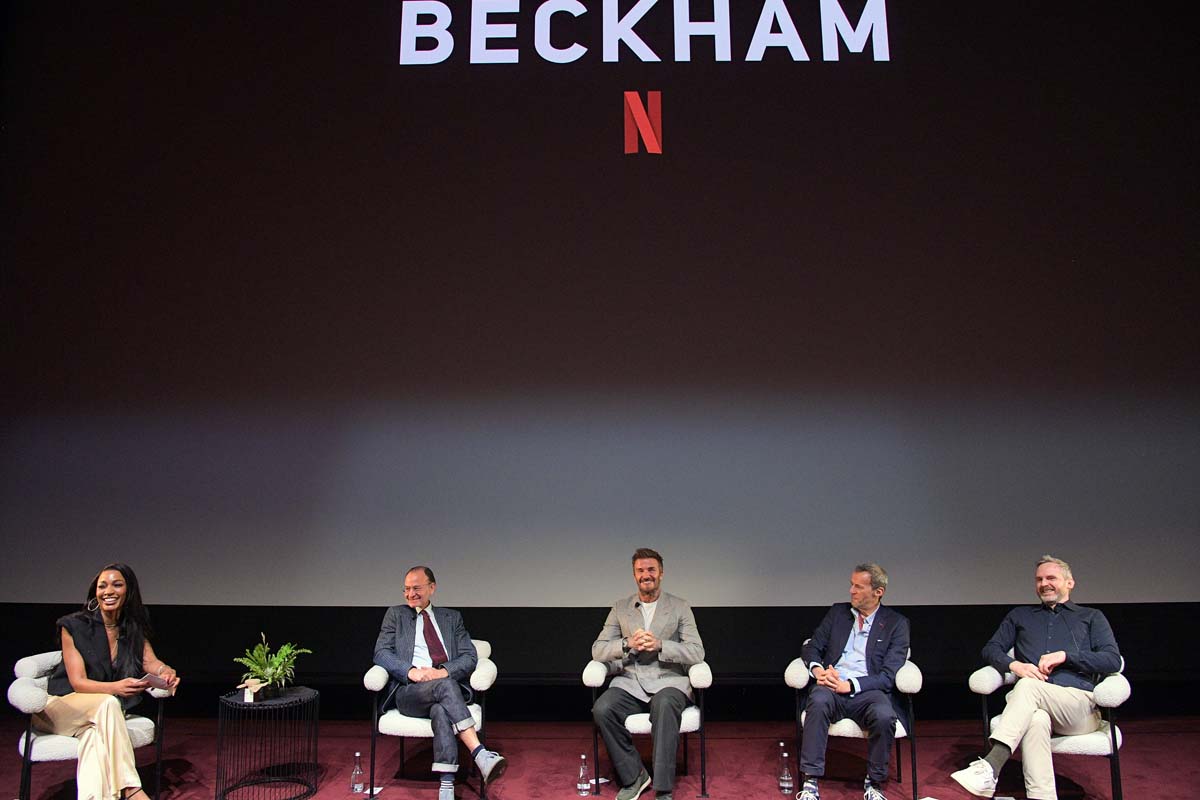
“Temp Love” baby!
It’s not good, but sometimes it works. It was funny actually because we took out Oasis, we took out Supersonic, they pulled those out. They said, “We’re not gonna get the rights. It’s too expensive.” Then I three or four weeks before we were finished with the whole production Adam DeLeo - who works at Netflix - he’s one of the commission editors - he watched the film, and said, “It just doesn’t work without this track. It’s the entry for the audience to the 1990s. Get Oasis back in.”
I love the humanizing of the interviews by using the real fans and the story about kids in school having to be told not to shave their heads like Beckham. It’s not all celebrities and famous footballers, it’s real people. Was that a conscious choice? Was that a choice that a producer or a director made or something that you decided? A little of everything?
No, I think I’ve gotta give a lot of credit to [director] Fisher [Stevens] on that. He’s so good with interviews. He’s really incredible. Both with huge, huge celebrities and people like me, just, just normal people that are part of the story. There’s something disarming about him. I know when I’m with him, I tell him anything… and I’ve told him too much. I love that it’s macro and micro characters and they just seem to work together. The initial cut there were less of the micro characters because we probably got excited by all these big characters. But actually some of the best moments are with the smaller ones and the lesser known characters. That was definitely Fisher Stevens’ choice and Billie Shepherd, the story producer as well, they had done a lot of that work beforehand - before I came on board.’

I have a term I use called an “answer cut.” The example is Beckham saying “I didn’t cut my hair to create attention. I’m not that person.” Then cutting immediately to a screaming Beatles-like crowd outside of a store.
Yeah. That’s where our point of view comes in. We like to cut the interviews against each other. That was the important thing about this film. I’m sorry, I’m Irish, so when I say “fil-um” I mean “film.” The most important thing was this film didn’t feel like just David’s voice. A lot of it’s his point of view, but we needed other voices to come into play and so that’s why we cut against things he said with people who may contradict what he said. Like in episode one, David said that the fame didn’t change him, but then we cut against that piece of interview with Sir Alex Ferguson saying, “It changed him.” It was important for us to do that a lot in the series so that it wasn’t just David’s voice. You see a lot of celebrity documentaries, and they seems limited by the voice. We needed as many as we could in this, but also we needed to have our own voice and we needed Fisher’s point-of-view on the film. So when when he would say one thing, we were able to counter it with something else. You gave one of the best examples where he said he didn’t do it for the attention… then cut to as much attention as any man can ever handle.
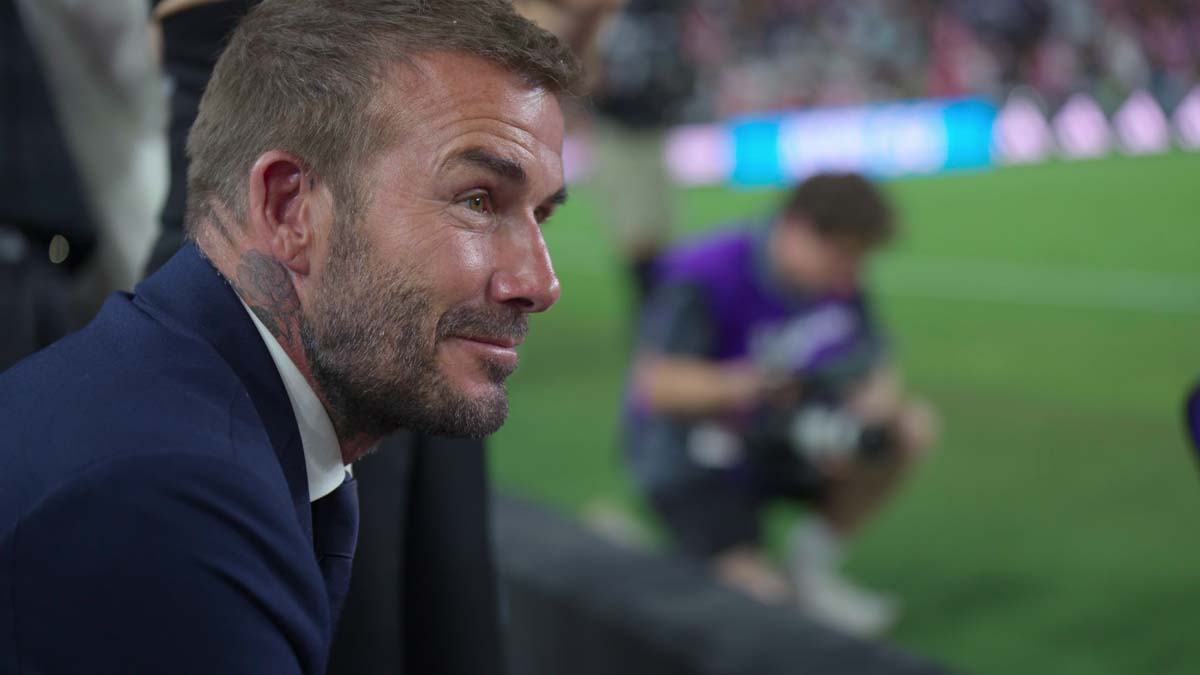
There’s such a natural progression of sound bites, but that’s obviously constructed and planned and maybe even evolved from something that was maybe a little too fat and sloppy. Can you talk about a rough cut thought “We need to tighten this up?” Or was it so tightly written that you didn’t need to worry about that?
I wouldn’t say it was written. They were still shooting. When I started cutting, they had a rough structure of what it wanted to be for the interviews. So when they were shooting the interviews, they had certain beats that doesn’t necessarily translate it into the edit. That structure they have in their minds about the story they wanna tell inevitably changes, especially in a series, because things are said in the interviews that just change everything. I go from one extreme to the other. I need to watch everything. I’m limited on this because the material is coming in as I’m cutting. I love watching everything, getting everything organized and then I jump from no cutting whatsoever to diving in and just starting fine cutting. I try to be a bit brave with it. I hate presenting rough cuts. I hate presenting, “Here you go. Here are some thoughts.”
I always try to show, “This is what this film can be both structurally and stylistically”. I like to work fast and cut very, very quickly and fine cut it. It’s got me into trouble in the past. Weirdly on this one, when we decided the beginning of the first episode was gonna be where it is, it just started to cut. I hate saying that it cut itself ‘cause that’s not the case. I think a lot of the credit has to go to the way Fisher interviews people. It was very easy for me to cut the film. I cut it chronologically. So I would start with episode one and I’d cut and then I’d send it to my producer and Billie and Fisher and John Battsek and say, “Here’s the first 30 minutes. What do you think?” They’ll have notes, but it’s not that far off what it ended up being in the end, although we were only supposed to be doing three episodes but then they got excited by the first episode they asked, “Can we do four?” And I said, “Well I’m having a baby in two months.” And they said, “Cool, can you do four?” I was on my own at that point in the edit. It all got a bit naughty. At that point, the director was off shooting “Succession” but we had a really good rhythm with Fisher shooting and watching cuts at the same time.
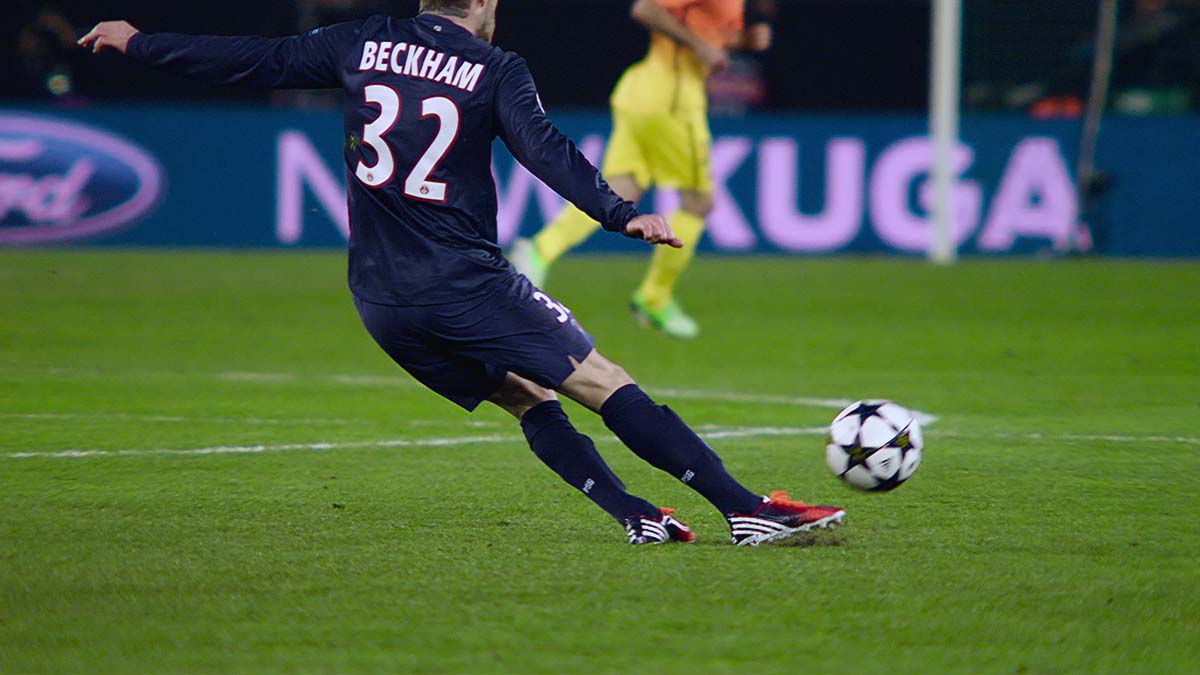
You go for the fine cut.
That middle ground… I dunno, maybe I just don’t have the patience for it anymore. I just like to dive in and cut and feel the music and make strong edits. I cut as if “What would this look like on TV?”
If that’s your approach then you’ve gotta be cutting with music because music is integral to most of these edits.
Yeah, yeah. And I need to have the archive in. I hate putting temp picture. We’ve got hundreds of hours of material. There must be a piece of archive that we can use here to illustrate or to say something. I’ll do a little rough cut for myself on a Monday or Tuesday. I’ll think, “Okay, here’s this rough structure of the first four minutes. Here are the characters - what they’ll say - then I’ll do a little rough cut of the archive. Then I’ll have these two sequences which are kind of talking to each other and related in some way. Then you bring out the big guns - you bring out the music and your thoughts and your ideas - and you just start to play with it. What happens if you put that first and that comes second, then you can cut out the music. Do we need it? I remember somebody said to me once in the edit, “You just have to back yourself!” You’ve got to be brave with your cuts then present it. I always say the best way to get an idea across to a director is to show them something. If you talk about it, sometimes you end up talking yourself out of it.
You said in the edit, you’ve just gotta “back yourself.” Is that what you said?
Yeah, “back yourself” like a horse. You gotta bet on yourself. Maybe that’s an Irish phrase. But you’ve gotta trust your instincts.

One of the things I noticed was the interspersing of actual play on the pitch (football footage). How much of that is simply storytelling and how much is thinking, “Man! How long has it been since we’ve seen Beckham on the pitch or score a goal or make a football play?”
That’s a really good question. The first version of this movie or this series - I call it a movie ‘cause Fisher would always say that this is a movie. He’d say, “This is one big long movie and and we gotta treat it like that.” He was right. The first version of it was all about football. It was a lot about winning leagues and cups. It was very much a sport movie, which for someone like me was great ‘cause I’m a big football fan, but, I showed my partner a version of it and there is no more honest feedback than somebody looking at their phone. I remember her doing it about 15 minutes in and I thought, We’re clearly missing something, because I knew she would want to watch a show with David Beckham.”
I said, “We gotta go back to scratch.” We went back to the basics. Looked at all the interviews again - what they had shot at that time - and realized that this isn’t actually a film about football, it’s a film about family and relationships, and we were using David as a way into that. We were using the football as a way into David and his life but we needed to do the opposite. That was a small change of philosophy, but it actually made sense to us. It may not make any sense to your listeners. He was confronted with two worlds. You cannot tell the story of David Beckham without leaning massively into his personal life and into his relationship with Victoria and his relationship with his parents and the influence of his football career when it goes wrong on his family.

Beckham said, it’s almost like a letter to his family. When we were in the football matches, inevitably when the film started to feel like it was losing direction, the question was not “What’s he doing in football?” Instead if was, “Where’s he at in his personal life?” It was always, “Where’s Victoria?” because she was absolute gold! I think she steals every scene she’s in and and it’s so unexpected what she gave to the film. A lot of people in this country had an expectation of what she would be. They thought they understood her in this, and I think we turned it on its head. Whatever part of their story we wanted to tell, there were always, like 12 cameras (paparazzi) following them around, so we were well-covered. So the rhythm of the film then became the balance of his personal life and his football life. We never wanted them to feel separate. They always felt like they were weaving.The hardest part of the edit was: how can we relate this to his personal life so that it’s not just a game? It can’t just be about: are they gonna win/are they gonna lose? It’s about something else. There’s more to it. Like all good sports movies - like The Karate Kid. The one film I kinda kept thinking of a lot - there were a few references in my head - but the one one I thought about a lot was the, The Fighter with Christian Bale. What they do brilliantly in that film is that every time he gets in the ring, he’s fighting something else. Not just his opponent. He’s battling something else that’s symbolic. It was the same with David. Every time we used a game that was relevant, he wasn’t just trying to score a goal, he was trying to prove something to someone else, or to himself.
I don’t know when the interviews with Victoria were shot, but I love the transition from the story of David’s stubbornness to the flashback to his boyhood and being discovered by Sir Alex to play. That’s all done through Victoria’s interview where she says “he went from a boy to a man and growing his muscles.” That was the transition. Did you know that was gonna be the transition or did you simply know we wanted to go from this story to this story and you don’t know how you were gonna do it?
That’s a really good question. That was definitely something that we found in the edit. As we were cutting it initially. I remember using David’s interview only and leaning into the archive much more to do it where he was worried about the relationship with him and Sir Alex. Victoria was a much more interesting character to do that because there’s a relationship issue then between her and Sir Alex at the time or a perceived issue in the media. There’s great archive of her talking about Sir Alex. It just felt right to use her. She’s really good on it. And she nailed what needed to be said at that point. She’s probably the best person in a position to say that and talk about that.
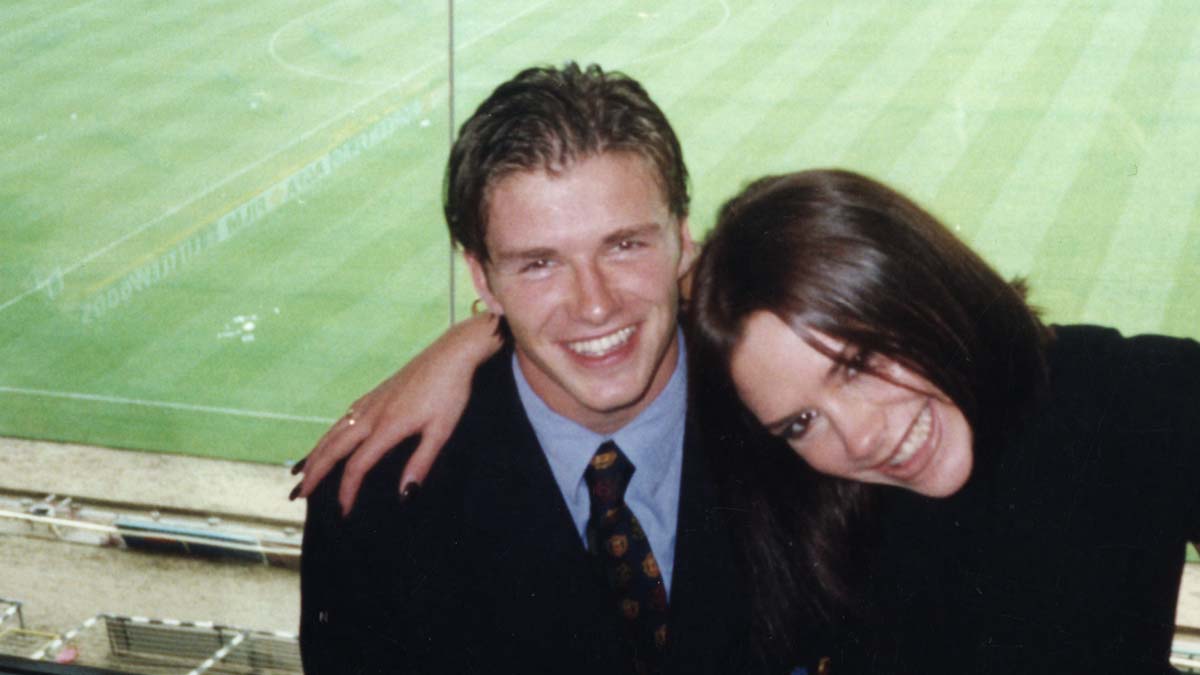
You chose to use a jump-cut when a TV presenter introduces the Beckhams. You could have covered that with b-roll that comes right afterward. You were saying how you don’t like to cover for no reason, so why choose to do a jump-cut?
I don’t mind a jump-cut. It’s not a conscious thing for me to put in jump cuts. For some reason I can live with them. I don’t like the word “cut-away.” I don’t like it because it is what it says. Which is: you cut away to somewhere else. Well, do we want to go somewhere else? I like staying in the moment and I think audiences can live with it way more than we think. I think a jump-cut in this day and age … you go on TikTok now and the whole thing is just jump-cuts. It’s a language that I think is much easier to speak now because of popular culture and so I can live with jump-cuts. Maybe I’m just being lazy, but I actually don’t mind it. Even in interviews, I don’t mind cutting if it feels right emotionally. I can live with it.
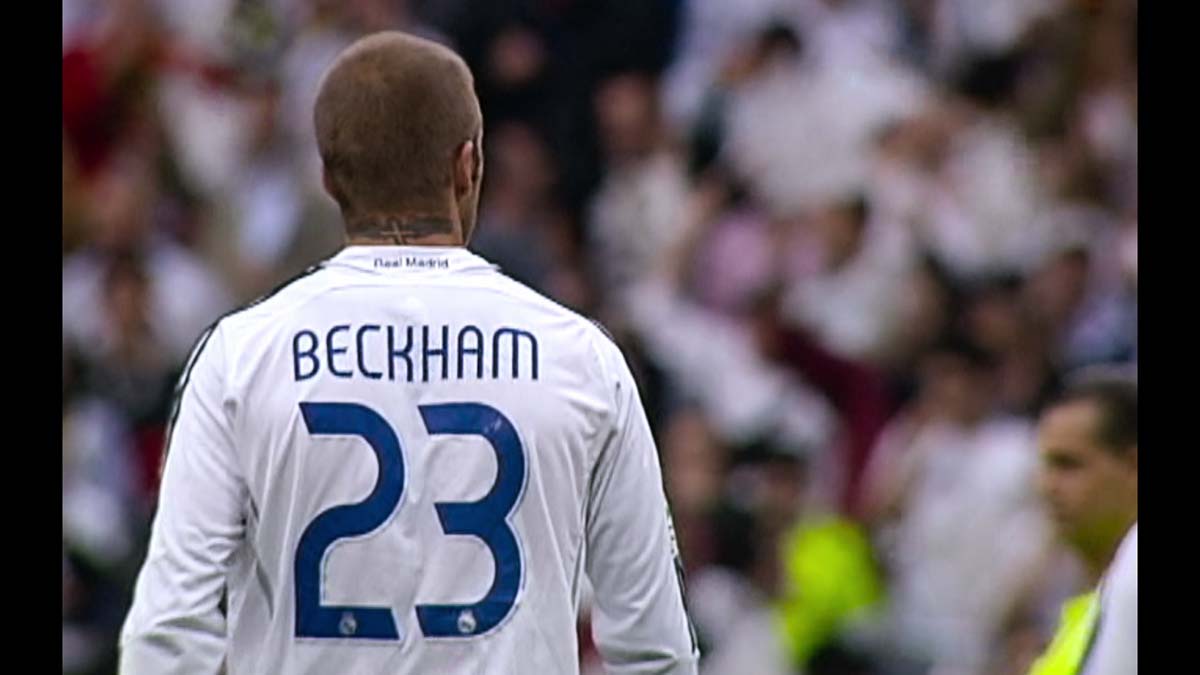
In the England captain story, you did some foreshadowing with the music as the game against Greece happens. Can you talk about that?Before you know the outcome of the game the music is very foreboding. Maybe Beckham fans already know the outcome. Talk about choosing to do that.
I think a lot of it had to do with the fact that this is episode three. You will have seen a lot of football at this point. Each match needed to feel like it was different from the previous one, but it wasn’t just another game. This game is one of the biggest matches of his life. He’s now captain of England. They’re about to qualify for the World Cup. It’s a massive achievement for any player, nevermind being captain. What’s important about the scene harks back to the previous episode. The scene isn’t necessarily about “will or won’t they get to the World Cup.” The fans hate him in the country at this moment. They still hate him in the previous episode. That’s what it’s about. It’s about how he overcame the hatred from a section of fans - not all of them. So when he gets to Captain England, it’s not about will they qualify for the World Cup? It’s about: will he win over the fans? Can he get them back? So at that point in the story, playing for England is great. It’s a huge achievement. But he’s about to walk into the lion’s den. He’s about to walk into a cauldron of shit and if this goes wrong, he’s toast. I mean he really is. That would’ve been one of the most embarrassing moments for England that season because you should be qualifying at home to Greece and for the first half it did go wrong. He really pulled that out of the bag. But we needed to remind the audience of the fear he was feeling of how the fans were gonna react and the music helped that. Otherwise it’s just another match that he’s playing.
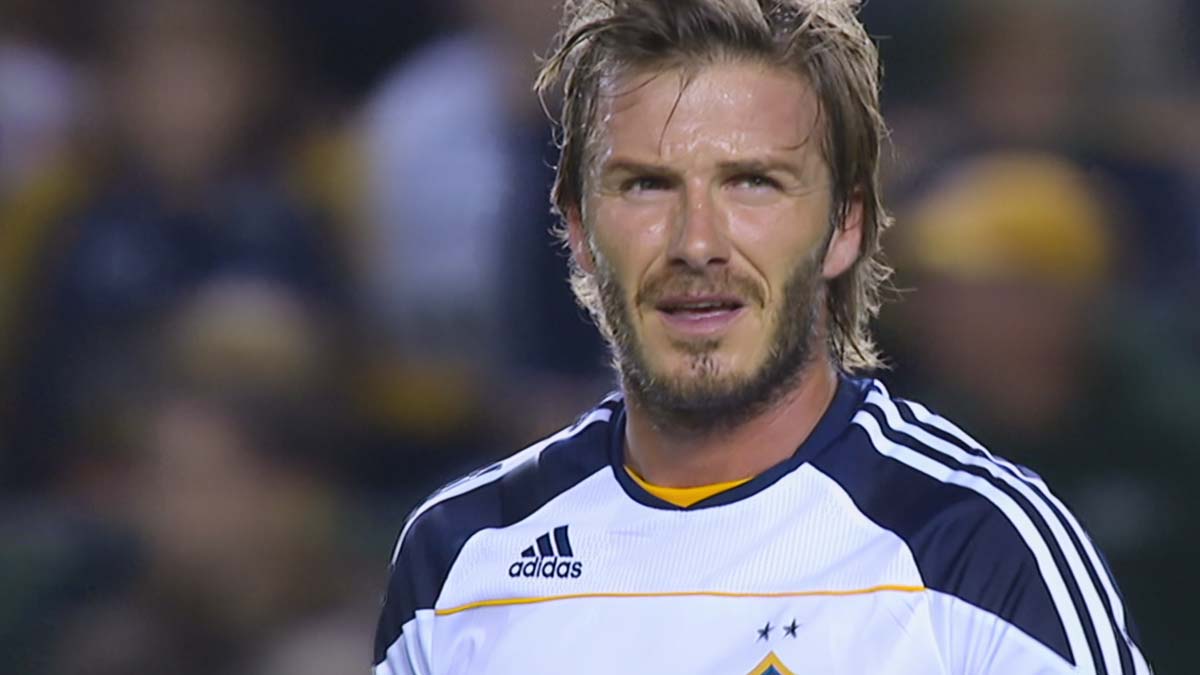
How was the general construct of the episodes created? Was that scripted? You talked a little bit about how things changed with when do we cut from one to the other and how you originally were only gonna have three and now you’ve got four. By the time you’re cutting episode three do you know the story beats you’re gonna hit?
We had an amazing story producer called Billie Shepherd. She did a huge amount of work on this before I came. She and Fisher worked really closely together to try and find as many beats of the story as possible. It’s years and years and you find the big ones and some of the smaller ones that people don’t know about, but they hadn’t necessarily figured out the structure of the film yet. They just were covering everything. My job in the edit, I think is to figure out where the story starts. What’s the first moment in the story? If you don’t know the start of your story, you don’t know anything. You literally don’t know anything. You don’t know where you’re going. You don’t know what it’s about. You don’t know where you’re starting.
You definitely don’t know where it ends. Always my job is - as I’m watching the material and before I do any fine cutting - you’re always asking yourself the question, “Is that the start? Can we start there? Is that the start?” Every time you watch a scene or a piece of interview, you always ask, “Could we begin here?” And for the longest time I was running outta material. I thought, “I can’t see it. I don’t know where the start is yet.” Normally I can, but on this one I didn’t until right at the end when an interview came in from his mom and she said “he scored a goal from the halfway line.” It’s the very first scene. The audience just went quiet. They’d shot that and his dad at a similar time. Then his dad said the line, “Once he scored that goal, they never left him alone after that.” It was the perfect line as a way into his story. Once you figure out the start it just kinda flows and you just gotta cut it. I try not to think about episodes too much, but when you get to a point you can feel it, you think, “This feels about right (as an ending).” Then I go back over it ‘cause then I know where the end is and you can sharpen scenes up ‘cause you’re trying to figure out what the theme of the episode is and then you move on to the next episode. You don’t have to figure out the start of episodes two, three, and four because they’ve already presented themselves because you’ve got to the end of episode one and we’re telling the story chronologically.
There are moments where we go into his past, but the most important thing is ignoring his backstory. Then, once you figure out where the start is - which was 1997 - forget about the story of his childhood because it’ll confuse us where that goes in the story. If we cut it properly and we figure out the themes of the episode, that stuff will present itself. You can spot the moments where we should go. For the longest time we didn’t have any backstory. It was his story from ‘97 onwards, kind of relentlessly, and we thought, “We don’t need to go into his childhood.” But that stuff starts to show itself. If you try and integrate backstory too early into your series, you lose sight of what the structure of the series as whole is.
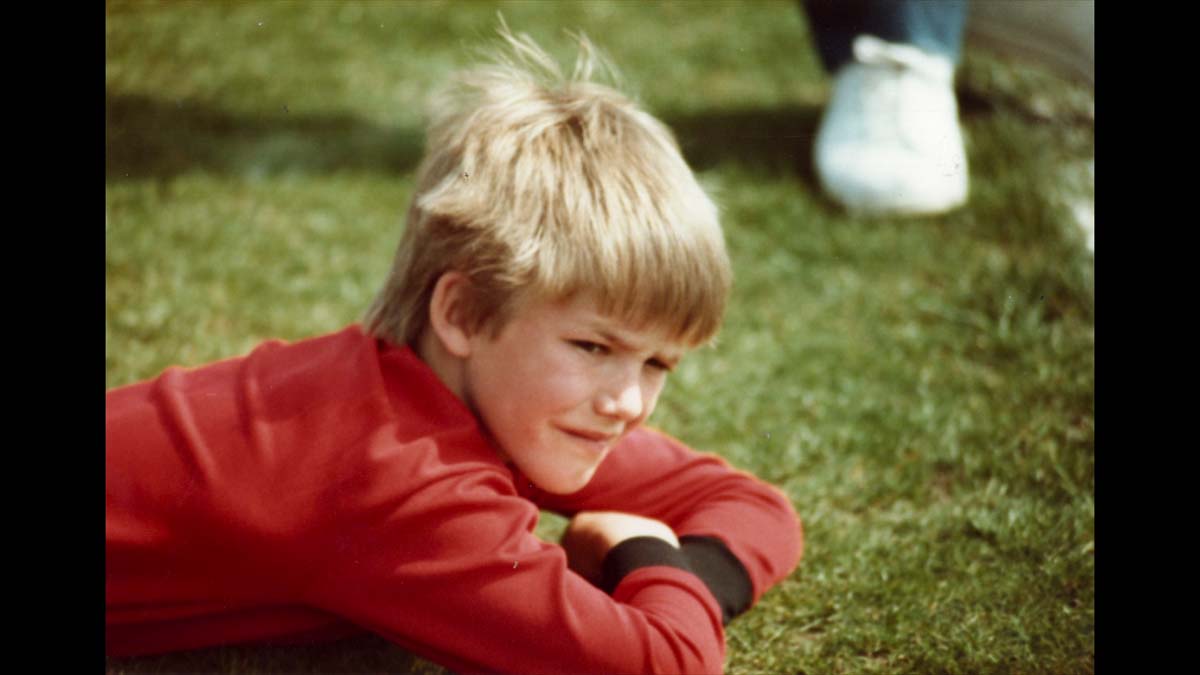
It’s also interesting that you say that knowing where the beginning is is the most important thing, ‘cause a lot of scriptwriters would say that it’s the end. You gotta know the ending.
I agree. But on this, the difference between scripted and documentary is that we have so much material that is telling us what to do. In scripted it’s great because you’re freer than you think. Whereas on documentary, you’re almost the prisoner of your material. If you don’t figure out where the start is, you’ll get completely lost in it. What’s great about finding the start is that it limits you. You say, “Okay, well this is where we’re going.” It may be wrong, but through that process you’ll figure out something else. But more often than not, I’ve managed to figure out the start.
I wanna call out something you said - which may seem counterintuitive. You said “you gotta find the beginning because it limits you.” So many people I’ve talked to have said that “to be creative you have to limit yourself,” or “having limitations makes you more creative.”
100%. Too much space is a disaster. It really is. Too much time is also a disaster. I know when I’ve been given too much time to cut a scene: I mess around. But when you’re under pressure and when you’re limited, there’s something inside you that says, “This is how this is going work.” It’s almost survival. I hate saying “fear” because there’s nothing worse than fear. I don’t like it. But there’s an instinct in you that if you’re under pressure and you limit the options, you find something way more creative than you ever would’ve found in the first place. And, and in this series, it was that: Let’s just start in 1997. Let’s start when he scores that goal from the halfway line and see where it takes us.

You mentioned how organized you are. How are your bins constructed? I’m assuming you’re in Avid. How much of that construction do you do, and how much does your assistant do, under direction from you?
I get it chronologically by year. I get the assistant to make bins that are: 1997, 1998, 1999, and all the material from that year, I get them to put it in.
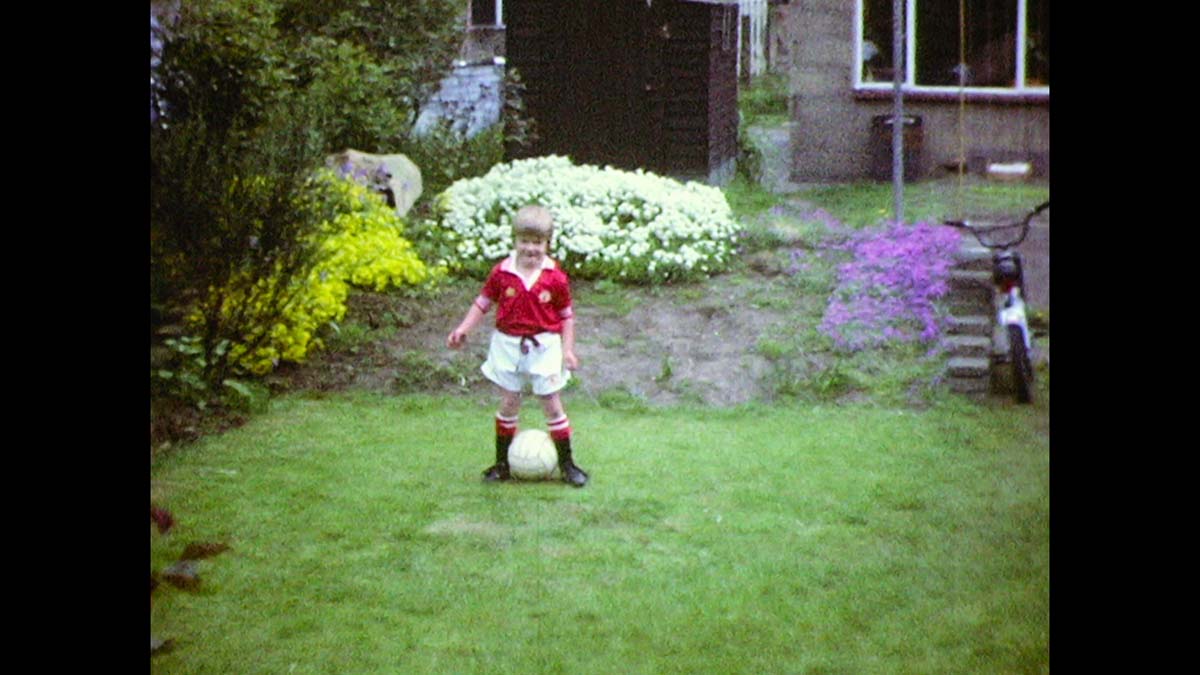
I’m assuming those are folders, right? ‘cause you couldn’t have an entire year in a bin.
I do, yeah. It’s bad because the bins become massive and I need every bit of RAM I can get. I like to keep the project really small, but the bin’s huge, if that makes sense. I may have 300 clips in that bin from 1995. And within that I’ll get the assistant editor to - at the start of each clip - add the month, and if possible, the day as well. So the bin is a chronological retelling of what happened that year. And I get it from 1960 to 2020. So I’ve got all those bins. What I do then is that I make my own bin and my own folders and I break that down into my own years.
But I create sequences. I don’t work within clips, I work within sequences. I take everything from a period of say January, 2000 and I’ll lay down all the archive from January, 2000 and I’ll watch it. And as I watch it, I’ll mark stuff. I’ll put a marker on and say, “David talks about Alex Ferguson here” or “David closes the door of his car when there’s a load of noise around.” Anytime anything happens in any of these clips I’ve categorized and I’ve marked up. I can find it very easy by just flicking through the markers. I don’t have to watch stuff again. There’s a really bad habit a lot of editors do: they press markers. “Oh, that’s a really good clip.” and they mark it, but they don’t write anything with it. It’s just a marker and it doesn’t mean anything. If you do that 50, 60 times in a day, you’ll forget what the first 49 markers are and you’ve gotta watch it again. It’s so time consuming. Whereas if I say “David says this” it’s almost like a transcript in markers. I can click to it and, and I don’t ever watch it again, but I know I can go look for it. The other great thing in Avid is that there’s a search function. So I can just type search and I come up with my own kinda marking system and then I can just search for it. “1960 David Kicks Ball in Garden” and it goes to the garden and you’re there. So the search function has really been my best friend for the last couple of years.
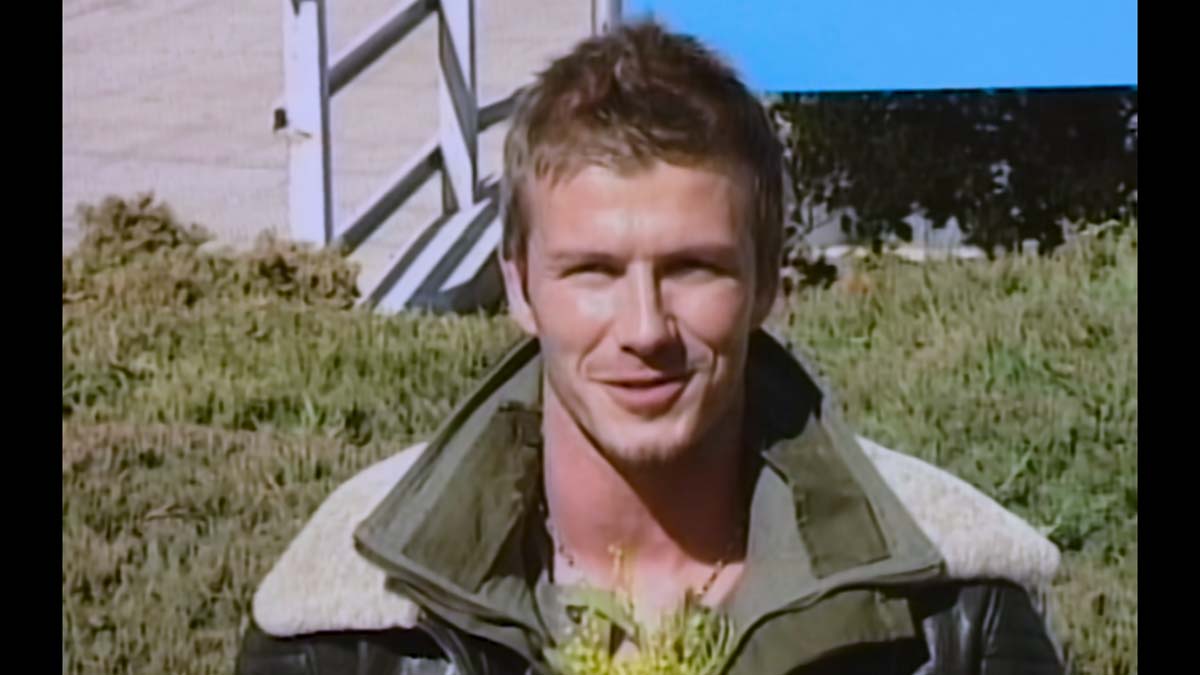
When do you choose to use talking heads on camera? Are you very specific about that? I think I’ve talked about this on the podcast before: I worked for Oprah for a decade and we had a rule: “You do not cut to a talking head unless it’s a critical emotional moment.”
Oh, interesting. I’m a big Errol Morris fan.
Me too.
I got into documentaries through Errol Morris back in 1999 when I was in university. I always saw documentaries as very serious and straight and what I wanted was to make movies. I wanted to make Back to the Future. That was my plan. Then when I saw what Errol Morris was doing with documentaries - and specifically interviews, how he used his interviews - I thought, “This is amazing! What he’s doing is incredible! He’s kind of making interviews almost become verite. It’s not just somebody talking. There’s something else going on here. When you cut together two interviews, you can say something even more. So I love using talking heads more than usual.
There are a lot of films that are now leaning massively into archive and that’s cool. I think that’s great too. It’s just my nature. I kinda love seeing their faces. Who’s telling me this story? What do they look like today? I love seeing the people tell their story. Especially with David and Victoria, anytime you cut to them it’s just magnetic. They’re just magnetic. They look great, first of all, but also there was a look in their eye.
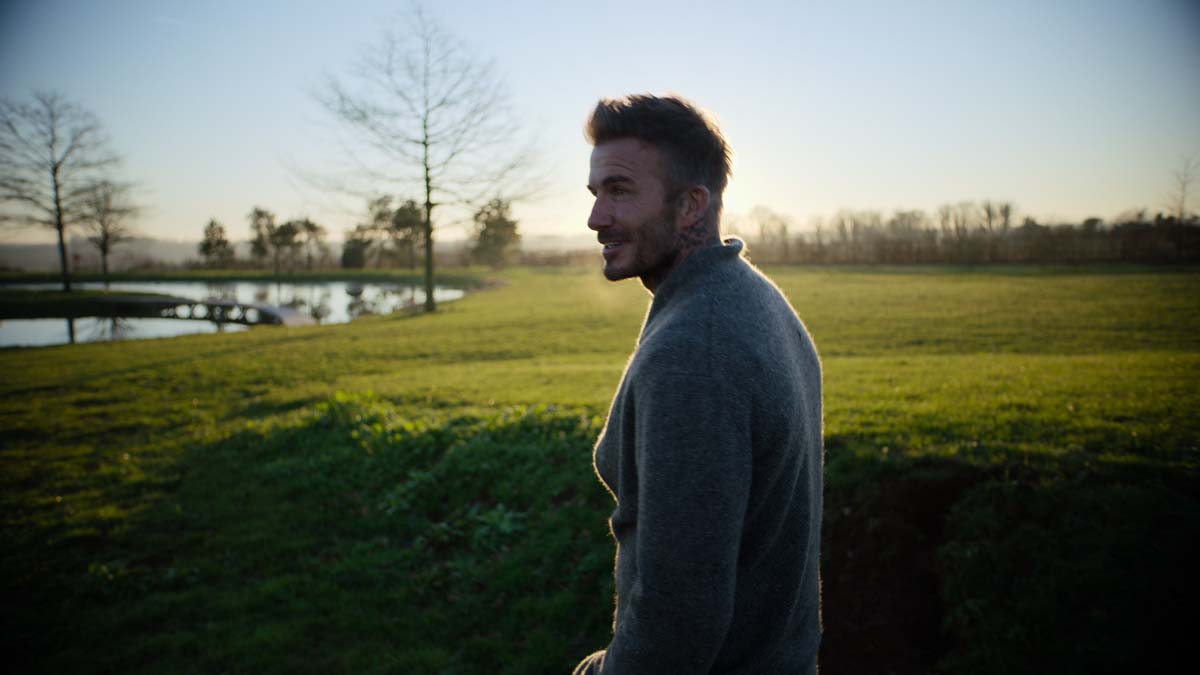
I watched this with my wife and she was saying, “He’s a beautiful man, isn’t he?” I had to agree: yes, he is. Even Ronaldo says that! It’s the only thing he says in English: “He’s a beautiful man.” So if you’ve got a beautiful guy and these two beautiful people, I guess you use the talking head a little bit more.
There’s also a look in their eye when they’re telling their story that’s more than what they’re saying. You can feel that not just by the way they say it, just by their voice, but the look in their eye. A lot of this was therapy for David too. A lot of the things he talked about he’d never spoken before, so you’ve got to look in his eyes when he’s telling some things. I love using interviews, but I love using archive. I think they should speak to each other. And some films obviously lend themselves to using more archive and no interviews. My dream is to make a documentary where it’s just interview. There’s no archive. It’s just some guy who sits down, tells a story for an hour and a half and that’s it. That’s the dream.
Did you see Errol Morris’s The Pigeon Tunnel?
Yeah, yeah. It’s really good.
That’s certainly not just talking heads, but he does know how to use a talking head, that’s for sure.
And The Fog of War as well. It’s just one person.
Talk about the editing pace of cutting to different shot sizes and talking heads. How many cameras did they have? Just two for interviews or more?
In some cases it was two. Sometimes it’s purely practical cutting between the two, because I’m trying to edit stuff out as you will do with me on this, I’m sure.
Although you can use it to dramatic effect. I think the locations that they shot in looked really cool too. They were really nice. So it was always nice to see. The superficial part of me liked to go wide because you could see David’s clothes and they always looked great. But when you could really use that tight shot is when he started to reveal things that you knew he’d never told before and you wanted to get in there with him.
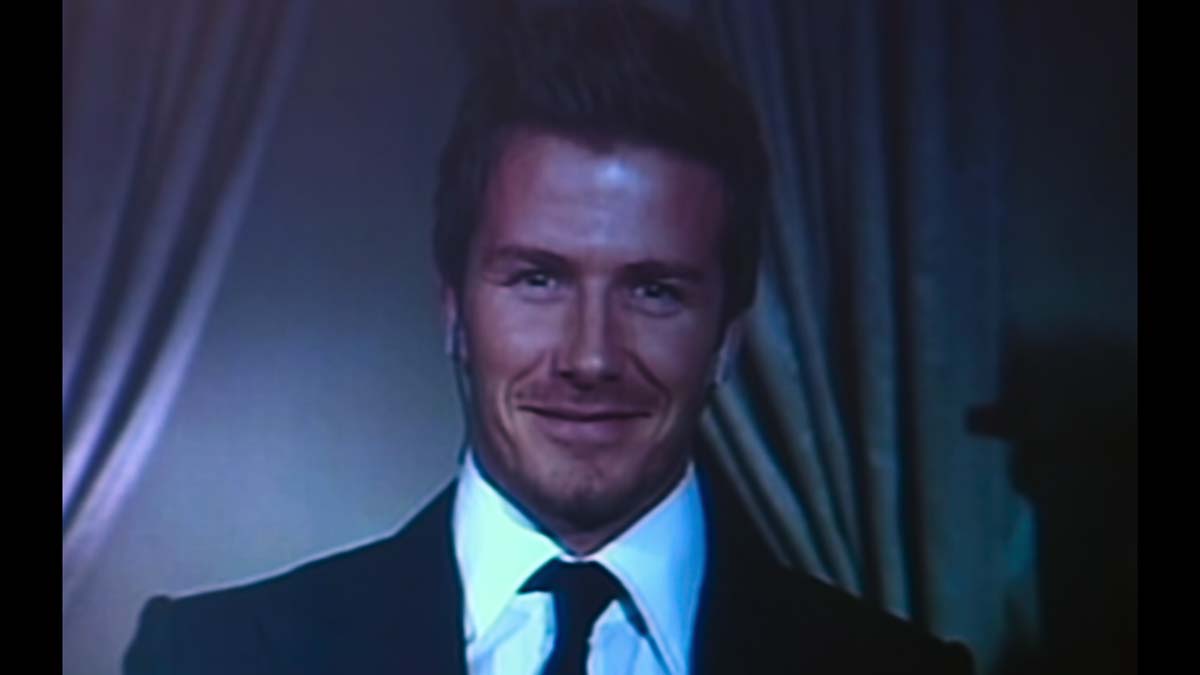
Did you try to use those different angles of the talking heads to keep the pace up too? I noticed at one point, cutting from wide to close, it didn’t feel like you were cutting to cut something out, though I don’t know. It felt more like you were trying to keep the pace up, even in the interview - keeping it to that same pace and standard.
I guess so. I think you might be right actually. I think there may be a rhythm to cutting the interviews that kept the pace of the film. To your point, I remember thinking early in the process when we started, there was always a question about “When does this slow down? When do we slow it all down?” Ignoring the opening ‘cause that was always a slow moment when the episodes start properly. In the past it was relentless. And I remember thinking, “Can we keep this pace up for four episodes? Will the audience buy it or will they just say, ‘This is too much.’” I heard Morgan Neville say his films sometimes are reflective of the characters and there’s the same with this. David’s life is relentless. It is really fast. It never stops. Back then it was constantly on the go as he was, as Victoria’s and his still is. So could we maintain the same pace in a series over four episodes? Is that possible? I wasn’t sure we could do it until Fisher shot a scene with him when he is at home and he’s just cutting this mushroom and he cuts it and then we stop the film. It’s in episode four. We have a scene that’s about a minute long of him just cooking a mushroom. It’s when he’s retired from football. And that’s the moment where it all stopped for him. And I was reminded of that scene in The Hurt Locker where the guy comes back and he’s in the shopping center and he’s pressed pause on something, on a completely different life and he doesn’t buy it. And he goes back into what, what he did in the movie. It felt the same with David. Then I realized, “Let’s try this. Let’s have the film be relentless up until that moment that he retires and starts to cook a mushroom. Then what happens is he goes back and he buys a football team. That’s episode four.
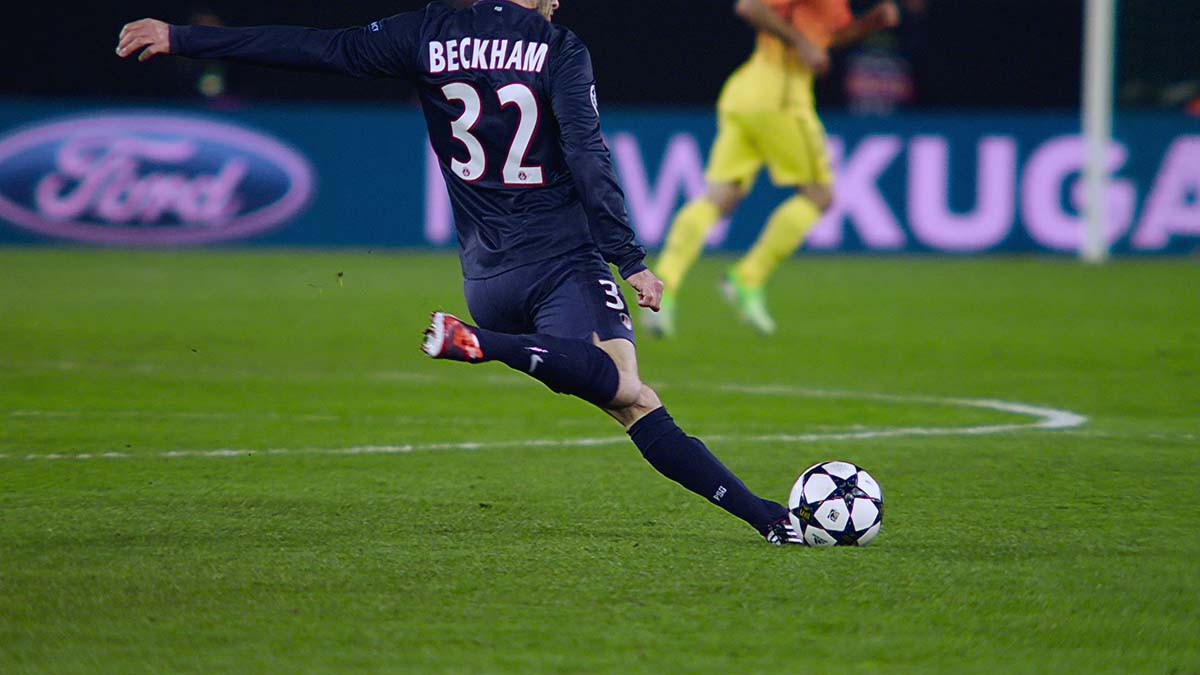
In the story of the Greece game, you cut to David on camera for some personal revelations and you cut out to the wide to see him messing with his wrist watch. I loved that.
Yeah.
If you’re watching a two camera interview, do you watch the wide knowing that your eyes can kind of see the close or do you watch the Multicam or you watch the wide and then go back and watch the same interview in the close?
This is gonna sound funny and I’ve never told anyone this: I watch both. I can watch both. I’ll have it on my Avid and I’ll make my Avid screen as big as possible. I have developed a way of watching. I can take in both. Maybe my left eye is watching one, But I can jump between the two as I look ‘cause I don’t wanna watch these things twice ‘cause it’ll take forever.
But if you’re watching JUST the close in that scene, you can’t tell what he’s doing with his hands. So you have to see that in the wide shot he’s fidgeting.
Exactly. I think you just gotta watch your material. I did in that case. I watch both angles and there’s something really honest about it when he does it. There’s something kind of sad. We all do it. They just start fidgeting with something when you’re actually kind of not trying to show too much emotion. I’ll do the same. I’ll start playing with my AirPod case. It’s so nice that you picked up on it ‘cause those tiny moments speak volumes and you gotta pay attention and watch your material.
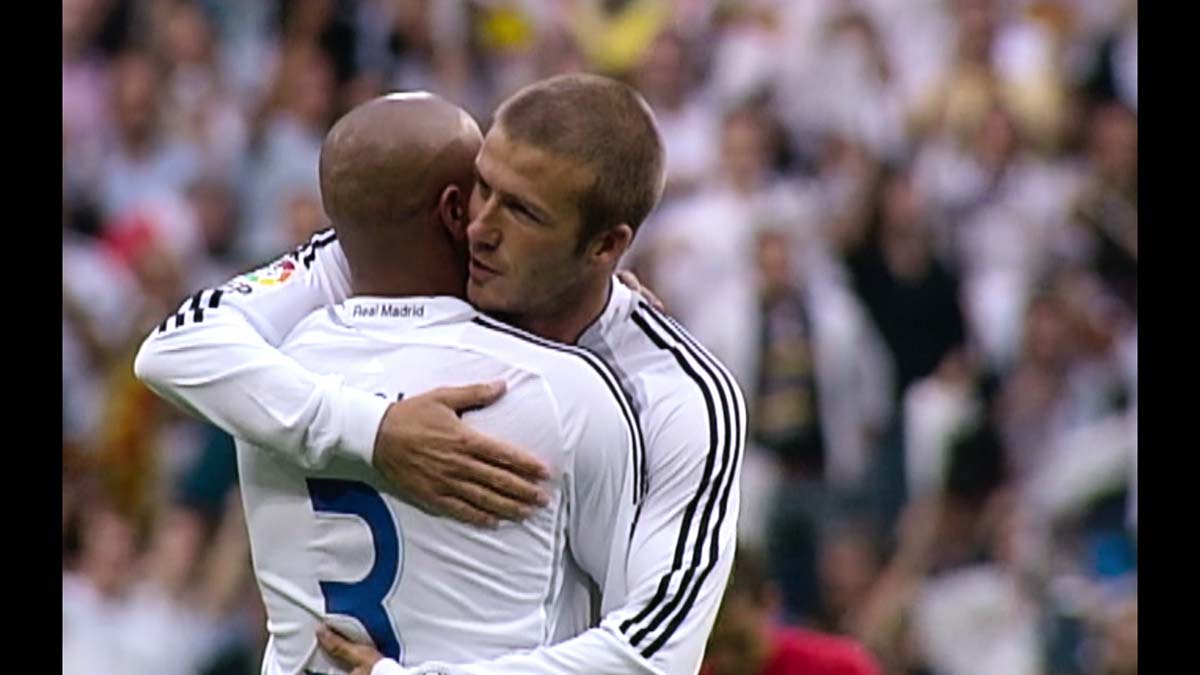
There is a moment right at the end of that interview. You held on his face after he makes a revelation. You didn’t just cut off when the words were finished. You held on him in silence for a beat or two.
That’s credit to Fisher. He didn’t jump in with the next question. He let it sit and maybe I may even even have cut his question out for it to be even longer. I don’t know. This film is relentless. The series is relentless, and those little tiny moments of just silence and quiet end up becoming really powerful because of it, because there are so few of them in the film, but when they happen they can be really powerful.
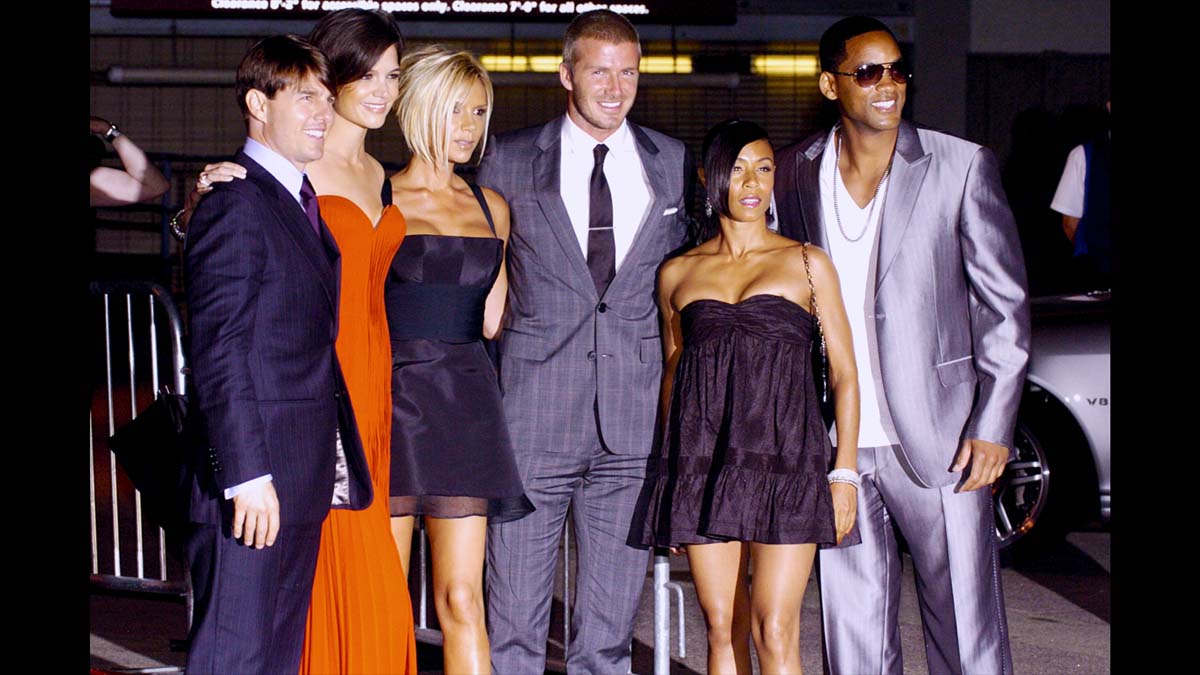
There’s a revelation in Episode three that when Beckham left for Real Madrid, that it wasn’t Beckham that wanted to go. Possibly all the fans would know this. You elliptically told that story in that you kind of set up that maybe Real Madrid wanted him and maybe Man United was having second thoughts. But you don’t know who chose. Did Beckham just go for the money? No, he didn’t want to go. That gets revealed later in the story. What you learn is he’s leaving Man United, but you don’t know why. You don’t know who made the choice.
Well, I guess the reason we do it is we tell it through David’s point of view as he experienced it at the time. This is his story. That’s an important thing. I think I learned a lot of that on Three Identical Strangers (a documentary Harte edited from 2018). It was all about what information do the main characters have at the time? That puts the audience in their shoes. In this case, David was surprised at what happened. He says in an interview, “What? What? Sorry, what? I don’t understand.” And the audience needs to feel that as well. It’s an old trick. It’s a bit like the Christopher Nolan movie, Memento. You’re in that guy’s head and through very clever filmmaking, you’re experiencing the story as he would: without memory. We were putting the audience in David’s situation. So what was a massive surprise to him was just as much of a surprise to the audience. Then they go on that journey that he did, which is: well, what happened? How did this happen? It makes it more gripping to do that because he wasn’t privy to the information before.
You were talking about how much you love archival and there’s a fantastic use of archival at the end of that story about leaving Man United. Beckham says, “Did I ever wanna leave Man United? Of course not.” And you immediately flashback to Sir Alex putting his arm around a very young Beckham. It’s certainly not the right timeframe for the transfer to Real Madrid, but it’s jumping back and illustrating the emotion of it and the power of it.
Yeah, I love that. I think it’s the power of editing when you’re able to do something like that. It’s not just a wallpaper cut: covering a cut. What you’re cutting is him describing the end of their relationship as we know it at Manchester United against the beginning of their relationship. When somebody passes away, it’s the first thing I think about: the moment I met them first. We are in David’s point of view. And at that point, I’d say what makes you sad is that at one time they had a beautiful relationship and he was like a father figure to him. And that’s what he’s getting sad about. It’s not that he’s being kicked out of Manchester United. What I think is upsetting him is that he’s saying goodbye to a father figure. And that image of him and Sir Alex in the dressing room is probably the best illustration of that. He puts his arm around him. He’s gonna look after him almost like a little boy to him. And he was almost like a father to him, even in that moment where they were obviously breaking up.

But what I want to get from you about that is you’re in this interview about leaving Man United and then you’ve got this archival that is totally different. Separate.
Disconnected. Yeah.
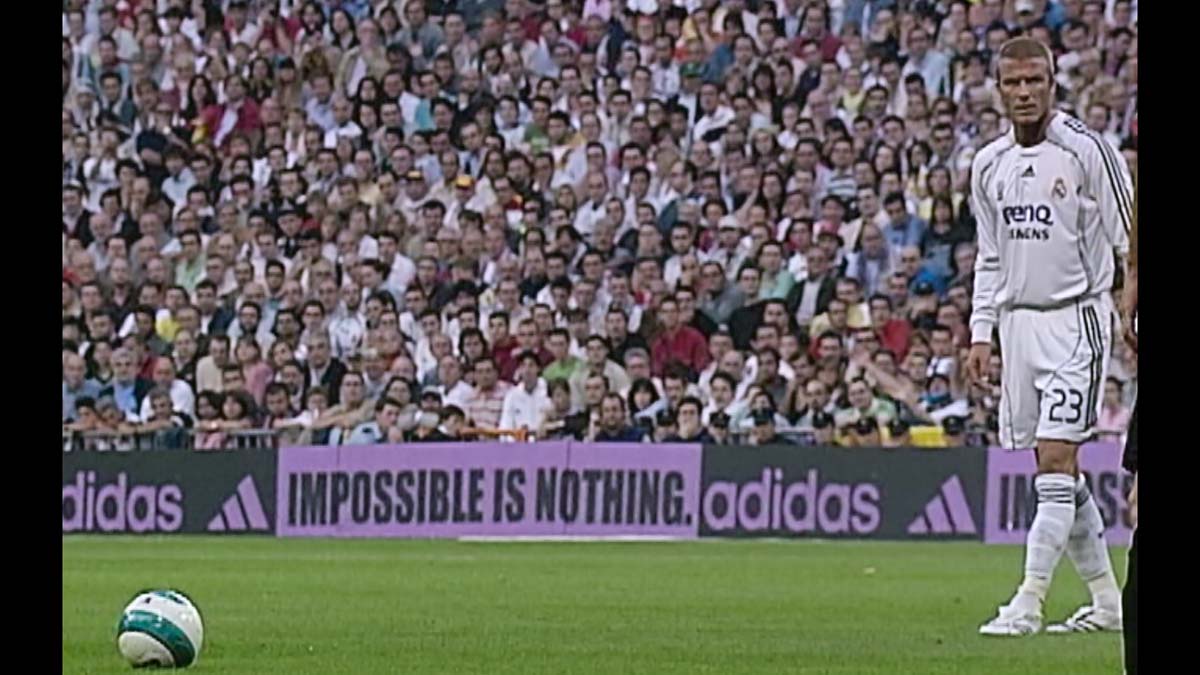
Disconnected. And you put them together. How did you even realize to put those together?
Weirdly, I think the music led me. I hate saying that because it gives a lot of credit to something that’s not yours. But I remember cutting the interview and I was cutting back and forth between him and Sir Alex and I was using a piece of temp music - weirdly from Whiplash - very quiet piano piece that I was keen to license ‘cause it worked so well, but our composers nailed it when we got them to rewrite it. I think maybe I had a moment where I connected to what he was feeling, where he was saying goodbye to a father figure in his life. I remember it flashed to me that I had the shot from 15 years before. It’s the kinda magic of an edit. I can’t describe it to you because it just happens sometimes. If you are going in the right direction, you’ll have a moment that you just think of a shot. We have maybe 10,000 hours of material, but for some reason a shot pops into your head that you have to use and thankfully I’m organized so I could find it in a couple of seconds and I tried it out. It comes down to organization at the end of the day, not inspiration. And it just happens sometimes. And sometimes when I’m cutting somebody will say something, I’ll think of something that somebody else said that I heard four weeks ago. And as long as you’re not tired and feeling stressed, those things will just come to you and emotionally it just worked.
It shouldn’t work because you’re right - at that time, it’s not the obvious thing. Maybe you want to see him and Alex Ferguson arguing or on the phone during that period. But it just emotionally seemed to work better than than than seeing him today. You always see it in other films. I lean massively into movie tropes and stuff, and there are moments where at the lowest point in someone’s life, they flash to one of the most beautiful parts of their life. That’s what movies are all about. It’s the only medium that can do that: that you can take the past and the present and just cut them together. It breaks your heart when you watch it. When I watch it I kind of think it reminds me of my relationship with my father. There’s something else at play: that inside us all as editors that allow for those kinda magic moments to happen.

I didn’t even get through half my questions, but I wanna let you go. The specific example I want to wrap up with is when Beckham goes to Real Madrid, he says during a press conference, essentially, “I love my family, but football is everything to me.” And you cut to Victoria in the audience hearing this thing that is very personal to her. Is that real? Did you say, I wonder what she’s thinking? And you cut to the exact moment? Or did you find the best emotional moment? My overarching question is: is editing manipulation and is that okay in a documentary?
I think there were two cameras on that, and as far as I know, it was the moment. It was very close to the moment because there wasn’t much coverage on that scene. To your point, I think editing is by its very nature manipulation. The minute you put a cut in, you are manipulating the audience to think or feel something. That’s definitely the case, but you have to be careful with it once you start taking liberties. That’s the truth. I mean, especially in this day and age, it’s game over. I work on a lot of films that a lot of eyes are on. You get millions and millions of ears. If you mess with the truth, you’re gonna get found out. There’s nowhere to hide on Netflix. There’s just not. I think you can manipulate the audience in order to experience something, in order to feel something. I think that’s just what the medium is,
Show the greater truth.
Exactly. In order to get to the truth - in order to tell what that story is. I’ve found every single time in an edit, the edit always gets in trouble when you’re not telling the truth. It just does. Every solution is what actually happens. You know, you try too hard to do something, to restructure something because it’s convenient for you in the edit because you’re under pressure for a deadline. You wanna make something work. And the truth may get lost a little, but further down the line, you get in trouble because of it. Without a doubt, the truth sets you free. It does, because emotionally it works. If you manipulate something, it just doesn’t work emotionally. The audience are smart and they can smell rats and they say, “I’m not buying that. I’m just not.” And the more truthful you are, the better it is. The more truth we have in life, I think the better the world will be and in the world we live in right now, that truth is under threat.








